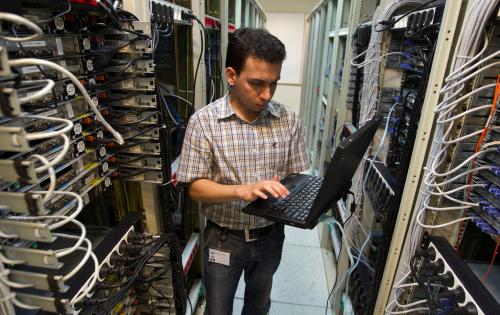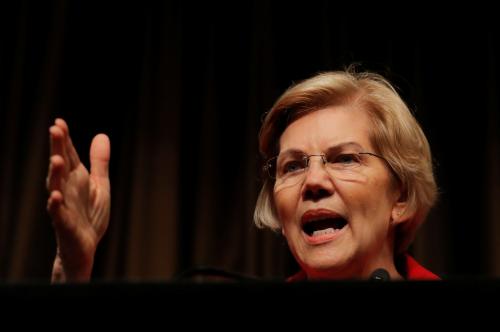The term “internet of things” (IoT) is said to have been first used in 1985. Roughly thirty years later, this collection of devices, computing, connectivity, and data analysis is still on the horizon, but getting closer each day. One consultancy estimates that IoT could constitute 11 percent of the global economy in 2025. Think of consumer devices residing in remote-controlled houses, alongside important improvements in business functions like transportation and manufacturing. A great deal of attention has been focused on privacy and data-security issues raised by IoT devices, which gather and analyze massive amounts of data to produce recommendations, reports, and decisions (as with a driverless vehicle). But there are also economic issues that may arise as the IoT matures. Here are six that bear watching:
Economic productivity
Robert Gordon argues that, with the exception of a decade starting in the mid-1990s, information networks have not driven productivity in the way that electricity transformed the American manufacturing sector in the 20th Century. But some believe now that IoT can boost productivity growth by increasing the efficiency of traditional business operations such as manufacturing, transportation, and retail. Whether the United States can return to historical productivity growth levels is critical to the American economy. In these times, IoT’s impact on jobs will be closely watched as well.
The nature of competition
Imagine the world to be divided between network-dependent products and services (like a mobile app or a smartphone) and network-independent products and services (like a home thermostat). The promise of IoT is to turn many “things” in the latter category into the former – dependent on ubiquitous connectivity in order to realize their full value to consumers.
In antitrust terms, many more kinds of products and services could occupy adjacent levels of a value chain in a “vertical” relationship. This occurs where consumer demand for two products is closely related: consumers who buy smartphones tend to buy wireless broadband service, for example. Vertical relationships have historically been viewed as an avenue to more competition between brands. But in a number of cases in recent years, the Department of Justice has recognized that they can cause problems as well, especially in highly concentrated markets. When the Antitrust Division considered Comcast’s acquisition of NBCUniversal, they were concerned that Comcast could raise content prices for companies that were competing for residential cable subscriptions.
How open will IoT be?
For many years, communications policy has asked whether communications networks act as gatekeepers with the incentive and ability to limit the competitive choices available to customers (This is the basis, for example, for the FCC’s 2015 Open Internet Order). History suggests that policymakers may scrutinize any IoT players that wield excessive power over consumers, perhaps in the antitrust context or as a separate question of regulation.
Who owns big data, your data?
The New York Times recently reported that “the big banks and Silicon Valley are waging an escalating war over your personal financial data” and who has the ability to monetize it. The ownership of Big Data can itself raise potential competition questions, as European Commissioner for Competition Margrethe Vestager has already noted.
Standards set terms of competition
The seamless transfer of information could account for forty percent of the potential value of IoT applications. An established standard can boost competition by allowing different devices to communicate with each other. It can also grant the winner a big marketplace advantage, as the battle between rival video formats VHS and Beta proved in the ‘80s.
IoT standards raise a series of policy questions: Are industry standards being set in a pro-competitive fashion? Are companies complying with their obligations under standards (a question featured in an analogous context in the recent Federal Trade Commission complaint against Qualcomm)? And what kind of role should government play in establishing the standards at the outset?
Economic regulation and the impact on competition
Regulatory actions can be very pro-competitive. For example, consider the actions of the FCC to free up more spectrum that can be used for IoT communications. And regulation can be required to ensure safety and other social outcomes, as with driverless cars. But regulation can either intentionally or inadvertently shape competition, such as when certain automobile industry lobbyists have been accused of seeking state-level regulation that tilts the playing field in their favor.
IoT is a misnomer. It commonly excludes “things” like laptops, tablets and smartphones; its things are less important than the activities they empower, and it could use private networks rather than the global internet. IoT is not even an “it” – we’re talking many systems engaged in many different activities. Nevertheless, IoT is going to be important, and the time has come to consider potential impacts of IoT on economic growth and competition.
The Brookings Institution is committed to quality, independence, and impact.
We are supported by a diverse array of funders. In line with our values and policies, each Brookings publication represents the sole views of its author(s).







Commentary
The internet of (economic) things
April 12, 2017